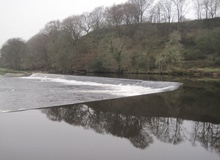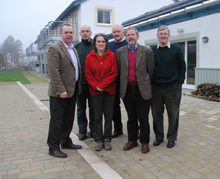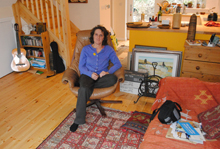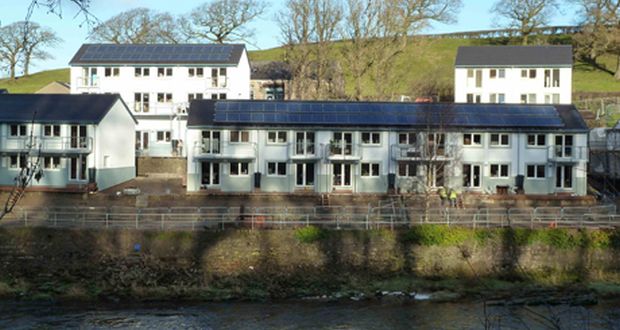If community energy schemes are part of the government’s energy masterplan, why are there so many planning obstacles? Alison Cahn shares her frustrations with the current system.
Originally published in the Guardian on 14th February 2013
Politicians of all hues love talking about community, urging people to get involved in planning, building and providing services for people in their area. But do they really know the cost to those involved? Do they realise the time, energy and expertise needed to jump through the many hoops involved to get a community scheme off the ground? Judging by my experience, I can only assume not.
I’ve just moved into one of the North’s newest experiments in communal living; a pioneering eco-cohousing project just outside Lancaster, created and run by the people who live there. So I know how difficult it is to bring community schemes to fruition, and how government agencies, far from helping community projects thrive, can frustrate them.
It took more than eight years to get from a good idea to the point we’re at now, where the 41 eco-homes are (almost) completed. Why? Well, doing anything outside the norm is difficult. Banks, planners, lawyers, utility companies, all those whose co-operation you need to make something happen, are often uncomprehending or even suspicious. The (mostly) volunteers running community projects are doing this in their spare time, often juggling jobs and children, and they are usually first-timers, learning the ropes as they try to navigate bureaucratic systems that are not designed with them in mind.
 The weir for the Halton Lune Hydro project.
The weir for the Halton Lune Hydro project.
After the blood, sweat and tears put into the cohousing scheme, our community is seeing it happen again with a community energyproject: Halton Lune Hydro, an attempt to install a small hydro scheme on a weir. Our cohousing community is involved because the cable carrying the electricity will cross our land, and the energy generated will feed into our micro grid. It’s a brilliant scheme – not only will it generate enough electricity to power up to 300 homes, but also enough income to fund numerous community projects, and provide environmental improvements to an important salmon river (using £300,000 of European grant funding).
With that grant and projected annual earnings of £156,000 from electricity sales and feed-in tariffs (Fits), the project cost of £922,000 should be paid off within eight years, leaving the annual income available to benefit the community. A proposed second turbine, separately financed, would increase that income to £230,000 a year. What a boon in an era of spending cuts.
But getting the permits needed from the Environment Agency (EA) has proved a nightmare. It’s not that Halton Lune Hydro expects to be given an easy time: they may be volunteers, but they have impressive credentials, including a chartered engineer, John Blowes, as project manager. What drives them crazy are the ever-changing goalposts and different parts of the EA not talking to one another. Repeatedly, when John and his colleagues meet EA officials, they think they have reached an agreement, only to discover more information is wanted, or something else must be done. They have even been asked – twice – to withdraw their application and resubmit it to give the EA more time to consider it.
Just before Christmas, when the second request to withdraw came in after three years of work on the project, John and the others running Halton Lune Hydro lost patience and made a formal complaint to the EA. The delays don’t just mean more work, but also, ironically, jeopardise the enviromental improvements linked to the scheme, as the European grant imposes deadlines to spend the money. John likens developing a community energy scheme to playing a game of 3D chess.
 The Environment Agency team visits the Lancaster Cohousing project.
The Environment Agency team visits the Lancaster Cohousing project.
Things progressed swiftly however when Steve Moore, the EA’s director in the north-west, got involved. After visiting the hydro and cohousing site (he was well impressed) he reassured John there wasn’t an anti-hydro element in his agency and the figures bear that out: of the 217 applications for permits in England and Wales since 2009, only nine have been rejected – and none of these were in the north-west.
However, most of these schemes will have been commercial, not community, projects. Barely a dozen community energy share offers have been launched in the past year – and these include wind and solar as well as hydro.
Moore told me the EA struggles to commit the time necessary to help ease community applicants through its complex processes. During his visit he said “official bodies like ourselves need to keep thinking about how we can continually simplify our systems to enable more of this to happen”.
“Community energy” – small-scale renewable energy schemes developed and (sometimes) financed at a local level to supply local need – is politically in vogue. Ed Davey, the energy and climate change minister, has called for a “community energy revolution”. So, surely the government’s energy bill, currently making its way through parliament, will kickstart this revolution?
Not as it currently stands. My partner, Kevin Frea, who has developed two community solar projects and is setting up a community energy network, tells me that the proposals introduce more complexity and so favour the big six energy generators over smaller community schemes.
 Alison Cahn relaxes at Lancaster Cohousing – eight years after the project’s beginnings.
Alison Cahn relaxes at Lancaster Cohousing – eight years after the project’s beginnings.
Anyway, legislation is only part of the answer. What is really needed is a radical rethink in the way the state interacts with those who want to get community schemes going. Because at present these projects are unbelievably difficult to pull off, demanding vast persistence and patience from the volunteers involved.
So what could the government do that would make a difference? One thing would be to create a new breed of official whose role is to help groups through the process; people who understand that volunteers in community schemes, unlike commercial operators, have to take time off from their real jobs to come to a daytime meeting; people with status, who can work between agencies and who can get answers to questions. Then maybe the revolution has a chance.
Alison Cahn is a journalist, film-maker and communications specialist living in Lancaster Cohousing
 Halton Lune Hydro The biggest community hydro in England
Halton Lune Hydro The biggest community hydro in England


